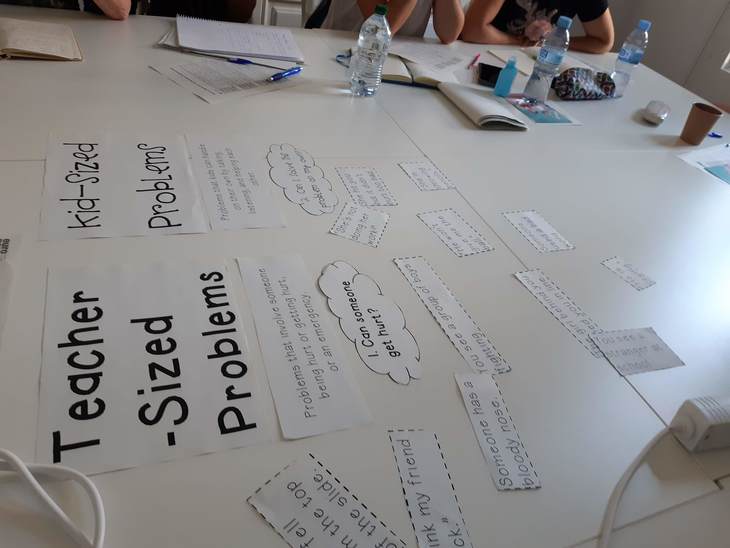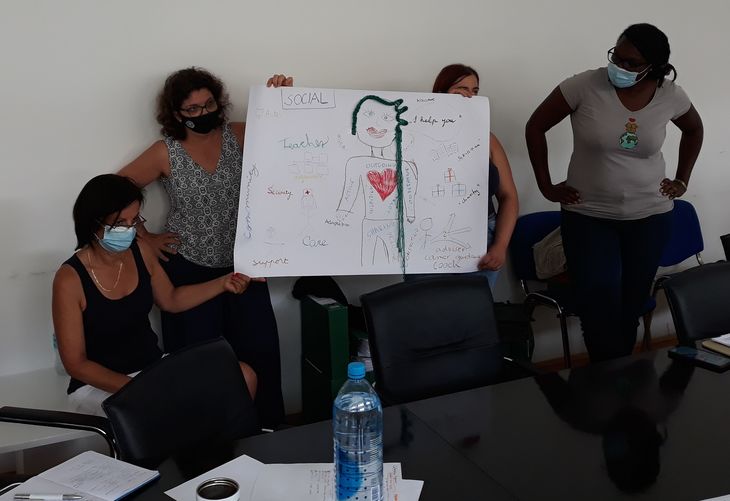
In this award-winning project, an experienced group of teachers focused on developing 21st century techniques and ideas, including critical thinking and learner autonomy skills. As their school welcomes students with special educational needs, the project participants also looked for ways to develop individualized approaches to help stressed and overloaded students. Colleagues studied yoga, mindfulness and coaching as well.
ELTE Radnóti teachers learn something everywhere - Teaching Strategies and Stages in Our Local and Global World
What motivated the school to get involved in the Erasmus+ project „We Learn Everywhere – Teaching Strategies and Settings in our Local and Global World"?
Prior to our current Erasmus+ project, we had already done another similar project on teacher training. That one involved 13 staff and proved to be so successful that everyone from the project team and the same number of people from the project applied for the next one. Due to the enthusiasm of our colleagues, we knew then that we wanted to submit another application.
What was the primary goal of the project?
In our project, we tried to coordinate the interests of the school, so that we could develop our knowledge in directions that would benefit the community, also everyone could learn something within their own area of interest, for which they have a real intrinsic motivation. We focused on developing 21st century techniques and ideas, including critical thinking and learner autonomy skills. As we have students with special educational needs, we also looked for ways to develop individualized approaches. We also chose several courses that focus on student well-being because, unfortunately, we have to admit that our students are stressed, many of them feel overloaded. So, for example, in relation to this, there were colleagues who studied yoga, mindfulness or coaching, which can also help with individual problems and needs.
How many mobilities and what activities have been implemented?
During our project, which was originally planned to last two years, we managed to carry out a total of 23 mobility activities, all of which were training courses. In 2019, the training courses went ahead as planned. Of course, in the meantime, there were always some minor changes, and we were even able to launch the dissemination. This year we even had the opportunity to go to conferences, organise our own internal training courses and Erasmus Day event, while also being able to host external guests. Unfortunately, however, the following year's training sessions were washed away by the pandemic, so we extended the project and finally finished it in the summer of 2021, when the situation was still not ideal. Many countries were difficult or impossible to reach, so we had to make several changesto keep the project's core theme in mind.
What places have you visited during the project?
We returned to the places we had been to and liked in the previous project – of course, not necessarily the same participant went back, but the schools we were happy with and found reliable were recommended to the next "generation".
So, for example, there were several people in Britain, in Canterbury, in Norwich, where there are high-quality institutions. Ireland, Dublin was a popular destination, in Finland our director attended a training course on the education system itself, but there were many courses in Italian and Spanish areas, where many of our colleagues have travelled. To our great delight, we also managed to attract non-English teachers to the project, with our French teacher in France and our two German teachers in Germany.
If one project achievement had to be highlighted, which one would it be?
I think the biggest achievement is that quite different members of the faculty have been brought together by this project and there has been professional communication between the participants. It is important to have activities that bring the faculty together, especially for a board of a hundred people where it's not easy to create a community. Especially now when many of the teachers are retiring. It is a great opportunity to get to know each other better, especially those who do not work together on a day-to-day basis - so new working relationships are formed, which in turn can trigger further projects.
How was the knowledge brought home incorporated into the daily life of the school, what has changed as a result of the project?
The knowledge gained can be used in many ways. One of the very tangible benefits is that we have managed to attract the interest of colleagues and strengthen the language skills of some of them to such an extent that we can participate in the new accreditation, where we can also carry out job-shadowing activities. We have also taken a big step towards building an international network, as our colleagues regularly go abroad and we have foreign teachers coming to us, so we are starting to think about internationalization. In everyday lessons, we are incorporating the knowledge we have brought home, and our colleagues are daring to make better use of technology and new methods, for example, our PE teachers include yoga in their lessons. The experience is that what we learn from mobility spreads quickly throughout the school, and ideas often fertilize each other as we put together knowledge from two completely different places, which together becomes even richer.

What feedback has been received from parents and students?
I think that for parents, participation in the Erasmus+ programme is, if not natural, a kind of expectation, as they are overly excited about international opportunities, especially when students can travel, or we are visited by foreign students. Going abroad is not at all an unattainable goal for our students, they are extremely open and would like to go even for a longer period of time. They can immediately use their language skills, and what they have learned so far will be instantly alive and useful. I think that our students feel like European citizens, and this is incredibly valuable feedback that, yes, we really are. We are really Europeans.
What are your plans for the future?
In the future, we would definitely like to take part in projects where we can involve as many students as possible. Right now, we seem to have managed to take a group of students to a training course where, as leaders of the school's green team, they will be able to learn leadership skills, environmental thinking, techniques – so they can be experts in the project. Of course, we want to continue what we are doing now, so we will apply for further training and job-shadowing partnerships.
|
Values of the project Teachers from ELTE Radnóti Miklós Primary School and Practicing Secondary School have completed a total of 23 mobilities during the project, taking part in training courses in order to develop 21st century techniques and the individual approaches for students with special educational needs. Apart from the acquisition of new methods and knowledge, the greatest benefit of the project is that it has brought together members of the teaching staff, and reliable professional communication has developed between the participants, which will lead to further working relationships and cooperation. The school's mindset has moved towards internationalisation, and thanks to the opportunities abroad and the project, students feel like European citizens. Organization: ELTE Radnóti Miklós Primary School and Practicing Secondary School |
Boglárka Simon | Communication Officer
Tempus Public Foundation | Erasmus+ Programme Directorate
Last modified: 21-11-2022















